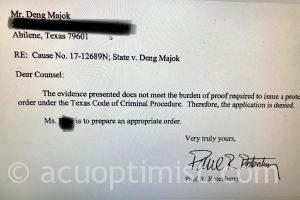Six months ago, Deng Majok had a 4.0 GPA, played cornerback on the Wildcat football team and coached youth basketball. Four months ago, he was sitting in a Taylor County jail cell accused of sexual assault – suspended from his job, the university and the football team.
Today he’s fighting to rebuild his reputation.
In October, four months after Majok’s arrest, a Taylor County grand jury declined to indict him for sexual assault, ending the case in which he said he was falsely accused.
“I’ve learned a lot,” Majok said, “but I feel like the criminal justice system smacked me.”

Deng Majok holds up a Wildcat sign at a 2016 football game. (Photo courtesy of Deng Majok)
Named to the fall 2016 Southland Conference Commissioner’s Honor Roll, the junior from Amarillo studied criminal justice and sociology while working as an Upward Sports for Children’s basketball coach at First Baptist Church.
According to court records from the 326th District Court in Abilene, a 20-year-old woman claimed Majok assaulted her in the early morning on May 7. The incident took place at a party that the woman had taken Majok to. Her statement claims she drank alcohol and ate a marijuana cookie, then got sick and laid down on a bed. She told the court that Majok came into the room and started having sex with her but she was “too drunk and high to have consented,” according to court records. The next morning she took Majok back to his dorm. The victim requested a pseudonym form with the Abilene Police so her name could remain anonymous. The Optimist does not disclose the names of alleged sexual assault victims.
When Majok went to work on May 9, he said his employers told him he was suspended immediately but gave no reason for the suspension. He said an interview with Abilene police on May 12 was the first sign that he was being accused of something. A month later, Majok said he went to the courthouse after a summer football workout to get more information.
“I went to find someone to talk to about the whole thing really,” Majok said, “and they told me they had a warrant for my arrest.”
Majok was immediately arrested for second-degree felony sexual assault at the courthouse and taken to the Taylor County Jail and bond was set at $25,000, according to jail records. He attempted to post bond, but said the bondsman never showed up by the end of the day. His family found out about the arrest because they heard about it on the news and social media. He waited in jail for four days until his older brother came to Abilene to bail him out. Meanwhile, unknown to him he said, he had been suspended from the football team and school.
“There’s not a class you can take to learn what you learn in jail,” Majok said. “I had to humble myself. At first I was angry at everybody but myself, and then I started looking around and realizing some of these guys are in here for the rest of their lives. Some of them aren’t going to see the light of day, some of them have kids and wives, and I’m over here complaining about football and school. I have the chance – I know my innocence – to see the light of day again.”
Majok admited he had sex with his accuser at the party. However, he insisted it was consensual and used Snapchat videos, texts and photos, to show that her complaint to the police didn’t line up with how she behaved that night. Majok said she also made contradicting statements in her complaint to the police and an application for a protective order.

District Judge Paul Rotenberry wrote a letter denying a protective order to Majok’s accuser.
On Sept. 12, an Abilene district court judge denied the alleged victim a protective order that would have prevented Majok from being within 200 yards of her or her family for the rest of his life. According to court records, Judge Paul Rotenberry wrote, “The evidence presented does not meet the burden of proof required to issue a protective order under the Texas Code of Criminal Procedure. Therefore the application is denied.”
As he waited for the case to go to the grand jury, Majok stayed in Abilene, attending every home football game and joining a mentor group led by Dr. Jerry Taylor, associate professor of Bible, missions and ministry. After each football game, he said he would talk to the coaches and remind them that he wanted to rejoin the team if his innocence could be proven.
“I’ve never even sat in the stands to watch a team I played on, so that was the first time,” Majok said. “I went with a couple friends, and we were just watching it, and I’d know what’s going on in [the player’s] heads.”
Months before he was arrested, Majok invited Taylor to a student athlete dinner as his faculty guest. Taylor said he felt honored because it was the first time in his 16 years of teaching that a student athlete invited him to the event. When Majok was arrested, Taylor found out about it on the local news.
“The news report just didn’t match the character of the person I had come to know,” Taylor said. “I felt eventually he would be vindicated.”
Majok’s family maintained belief in his innocence, and their support helped Majok stay positive through the experience, Taylor said.
“We talked, we prayed, we talked, we prayed and he maintained a positive mindset,” Taylor said. “He did not speak disparagingly, just focused on what he wanted to do as far as restoring and repairing his reputation.”
A Taylor County grand jury reviewed the case and decided in late October not to indict Majok, according to the Taylor County district attorney’s office. When a grand jury decides not to indict, it is deciding not enough evidence exists to go to trial.
Majok began taking steps to rebuild the life he had before being arrested. He said he met with an academic advisor to register for classes and started on a conditioning workout plan, hoping to rejoin the football team.
Lance Fleming, sports information director, said Majok has not been reinstated to the team and has not worked out with the team. His status will be discussed after the end of the 2017 season.
Without being prompted by his lawyer, Majok kept all the records regarding the case organized in a three-ring binder. Although he was not indicted, it still could take several years to get the arrest expunged from his record. Dan Joiner, a Taylor County assistant district attorney, said Majok will have to fulfill certain requirements and “stay out of trouble” to get the arrest off his record. Joiner also said Majok will not be repaid fees paid to a bondsman.
“The damage is done, that’s the thing,” Majok said. “It’s a heavy price to pay.”
He said he still plans to continue studying criminal justice and trying to go to law school despite his experience with the criminal justice system.
“I learned a lot of lessons from this,” Majok said. “Right now I’m focused on clearing my name and trying to get back in school.”
